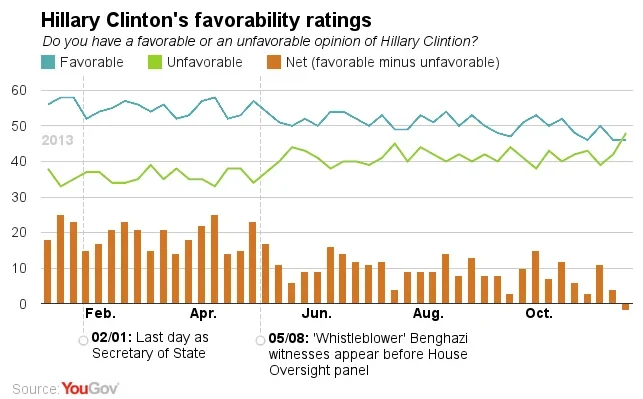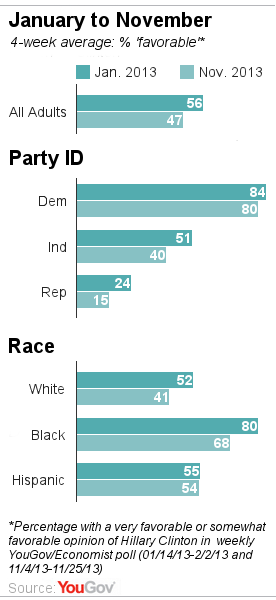The former Secretary of State’s favorability ratings have eroded among Independents and Republicans since she left Foggy Bottom.
Nearly nine months after leaving office, more Americans have an unfavorable than a favorable opinion of former Secretary of State Hillary Clinton, according to a recent YouGov/Economist poll. However, Clinton remains the indisputable favorite among Democrats to be their 2016 presidential nomination.
During much of her tenure as Secretary of State, Clinton enjoyed generally positive ratings, ratings that continued through much of the spring following her departure from Foggy Bottom: from January through April her net favorability numbers fell below +15 only three times.
But starting around mid-May of this year, the positive feelings began to recede and the secretary’s image has not recovered since, with nearly half of Americans (48%) now holding an unfavourable opinion of her, compared to 46% with a favourable one, for a net rating of -2.

The shift in May suggests that negative press surrounding the tragic September 11, 2012 attack on the consulate in Benghazi, Libya, which led to the death of U.S. Ambassador Chris Stevens and three others, may have impacted views about Clinton and her tenure at the State Department.
It was in early May 2013 when it was reported (first by Stephen Hayes in The Weekly Standard on May 3rd and then by Jonathan Karl in an ABC News exclusive on May 10th) that the Obama administration had edited and ‘scrubbed’ information from the talking points on Benghazi issued to then-U.N. Ambassador Susan Rice. It was later revealed that the reports were inaccurate.
On May 8th, the House Committee on Oversight and Government Reform held a panel on Benghazi, which featured testimonies from three witnesses – described by committee chairman Darrell Issa as ‘whistleblowers’ – one of whom claimed more help could have been sent to the consulate but was held back under orders from a higher authority.
Politics and demographics
Clinton’s popularity has ebbed with Republicans, but also among some other key groups.
From January 14th to February 2nd an average of 24%, or about a quarter of Republicans had favorable views of Clinton. But over the first four weekends of November her rating with the same group was just 15%.
An even greater drop is visible among Independents, traditionally a particularly important bloc of voters, a majority (51%) of whom viewed Clinton favourably during January. For November, the same number is over 10 points lower, at 40%.
There has been hardly any shift in her support from Democrats, a group which still has overwhelmingly positive views of Clinton (84% favorable in January; 80% in November).
However, Clinton’s image does seem to have declined among African-Americans, another key Democratic voting group, from 80% favorable in January to 68% now.
Still the (Democratic) frontrunner
None of this appears to have damaged her standing as the clear frontrunner to be the Democratic candidate for president in 2016, at least among fellow Democrats.
In fact, over the same period when her favorability ratings have suffered, Clinton has actually increased her lead over other possible contenders like Vice President Joe Biden.
A YouGov/Economist poll conducted January 7-10 showed Clinton clinching the support of 51% of Democrats, with an already sizable lead over Joe Biden who was preferred by just 9%. In a poll conducted at the end of October, Clinton received the backing of three-quarters (76%) of Democrats – her highest level of support yet – while Biden remained stalled at 9%.
And interestingly, while many commentators have credited her ‘non-political’ role as Secretary of State for allowing Clinton to keep free of the partisan fray, the same effect does not seem to hold true for her successor.
In the survey conducted November 23-25, just 38% of Americans said they had a favorable opinion of current U.S. Secretary of State John Kerry, the 2004 Democratic presidential candidate and former Senator from Massachusetts. 48% have an unfavorable opinion of Kerry.
Image: Getty
Full results can be found here.
Economist/YouGov poll archives can be found here.









